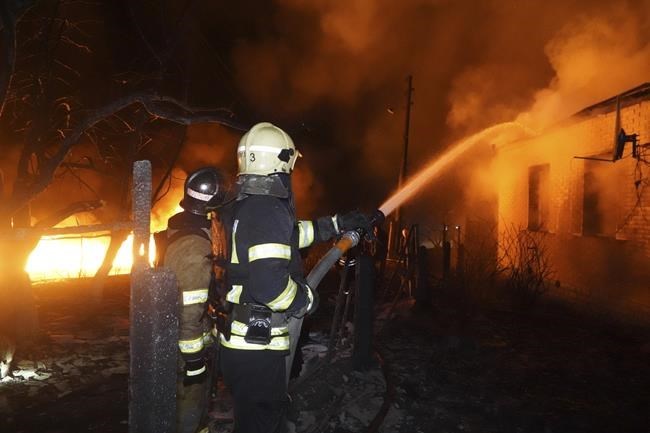OTTAWA — Canada sanctioned 10 more Russian officials and businessmen and 153 entities Friday, with Russia's full-scale invasion of Ukraine set to pass the second-year mark this weekend.
Foreign Affairs Minister Mélanie Joly announced the new sanctions in co-ordination with the United States and the United Kingdom. The European Union also announced new sanctions Friday.
In a statement Joly said the sanctions send "a clear message" to Russia and President Vladimir Putin.
"We stand by the people of Ukraine as they are bravely defending their rights in the face of Putin’s unjustifiable and aggressive actions," she said.
"We will continue to use disruptive measures against the Russian government, targeting its ability to wage its illegal war until Ukraine’s sovereignty and territorial integrity are fully restored."
Russia's embassy in Ottawa dismissed the sanctions immediately.
"Another round of sanctions by the Trudeau cabinet is meaningless, just like all previous measures of this kind," it said on X, formerly known as Twitter.
"Russian citizens and organizations couldn’t care less."
Similar statements were posted by Russia's missions in London and Brussels. The U.K. added about 50 names to its sanctions list Friday and the E.U. added nearly 200.
Russia launched a new military invasion in Ukraine on Feb. 24, 2022.
The UN Human Rights Monitoring Mission in Ukraine says it has verified that more than 10,500 Ukrainian civilians have been killed and nearly 20,000 injured in the conflict.
Canadian regulations allowing for the sanctioning of Russian officials and entities originated in 2014 after Russia invaded and annexed the Crimean Peninsula.
Friday marked the 59th time those regulations were expanded, this time targeting a longtime aide to Putin and businessmen in the rail, construction and IT sectors.
In a statement released Friday to mark the anniversary of the full-scale invasion, Prime Minister Justin Trudeau highlighted the ties between the two countries and the $9.7 billion Canada has committed to helping Ukraine.
"If we fail to stop Russia’s advances, if we allow one despot’s invasion to embolden countless more aggressors, and if we allow Putin to redraw the map as he pleases, the world will look much different and much worse," Trudeau said.
U.S. President Joe Biden said Friday his government was adding more than 500 new sanctions and imposing 100 new export restrictions related to Russia.
The new U.S. sanctions target Russian firms that contribute to the Kremlin’s war effort — including drone and industrial chemical manufacturers and machine tool importers — as well as financial institutions, such as the state-owned operator of Russia’s Mir National Payment System.
"They will ensure Putin pays an even steeper price for his aggression abroad and repression at home," Biden said.
The U.S. sanctions also come in response to the death of Russian opposition leader Alexei Navalny, a fierce critic of Putin who had been jailed since 2021.
The U.S. State Department added three prison officials to its sanctions list, including Valeriy Boyarinev, the deputy director of Russia's federal penitentiary service. Boyarinev was promoted to colonel general three days after Navalny's death.
Joly did not mention Navalny in her statement Friday, but Global Affairs Canada summoned Russia's ambassador in Canada, Oleg Stepanov, on Feb. 21, to hear Canada's condemnation of Navalny's death.
Russia's prison agency claimed that Navalny, who was serving a 19-year sentence in an Arctic penal colony, lost consciousness after a walk and could not be revived.
Canada has previously sanctioned people it believed were involved in human rights abuses against Navalny, including Boyarinev.
Canada is also expanding the language of its ban on exports of goods to manufacture weapons to specifically bar the export of explosives and detonators used in the mining and construction industry.
The sanctions freeze assets and prohibit any dealings with people and entities on the designated list, which now contains more than 2,100 names. Individuals on the list are also inadmissible to Canada.
This report by The Canadian Press was first published Feb. 23, 2024.
— With files from The Associated Press
Mia Rabson, The Canadian Press



